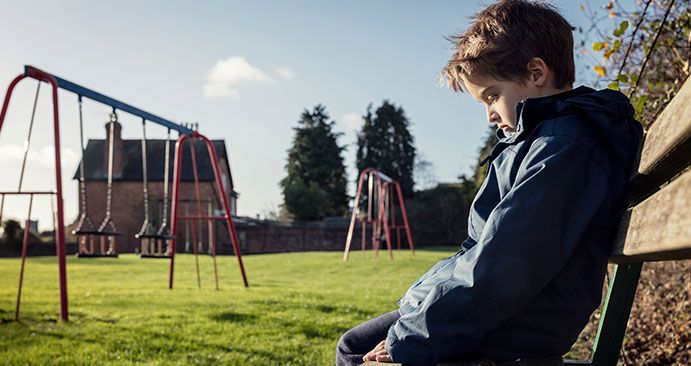5 Tips for Protecting Your Child with Special Needs from Bullying
September 20, 2016
A post by AngelSense, a GPS & voice monitoring solution designed for children with special needs.
Learn more about how AngelSense’s GPS tracking device can help improve your child’s safety and well-being.
Bullying can affect all children, but the impact tends to be longer-lasting and far more severe for children with special needs. If not managed properly, bullying can result in lifelong insecurities, low self-esteem and other behavioral issues. The problem is that special children are more likely to be targets, and yet are often unable to communicate this abuse to parents and caretakers. One study found that of all school going children who are bullied about 63% are children with special needs.

A survey of special needs parents conducted by AngelSense found that 80% worry that their child will be bullied on their way to or while at school. But perhaps what’s even more alarming, is that the same survey found that of the parents who said their special child had been bullied, 94% confirmed that there were multiple bullying incidents.
What constitutes bullying?
Bullying can take on many different forms, and isn’t always physical in nature. It can include everything from name calling and teasing to spreading rumors about a child and social exclusion. Physical abuse such as pushing, pulling, hitting or kicking would also be considered bullying. Increasingly, social networks like Facebook and Twitter are being used for cyberbullying to spread lies, rumors and hurtful pictures about other children.

Why are children with special needs more likely to be bullied?
Some studies indicate that special children are nearly five times more likely to be bullied than their peers. Why is this the case?
- They have a unique way of communicating – they may say inappropriate things and/or make gestures which others find amusing or offensive
- They struggle with social cues and nonverbal communication – this can make for unusual social interactions, and often means they aren’t aware they’re being bullied.
- They tend to be loners – not only does this draw attention to them but it also makes them easy targets. They’re far more likely to be excluded and it’s not uncommon for other children to gang up on them.
What are the telltale signs that your child is being bullied?
One of the main things to look out for is a sudden change in behavior. This could include a noticeable increase in anxiety, trouble sleeping and more meltdowns than usual. It’s also not uncommon for a special child to start bullying their siblings at home. Oftentimes, these children don’t understand that bullying is wrong, and will emulate their peers’ negative behavior.

A few other signs to look out for include:
- Signs of physical harm
Your child may come home with usual bruises or scratches. You may also notice that their clothing is dirty and that certain items, like shoes or a bag, are missing.
- Sudden reluctance to go to school
If your child suddenly becomes reluctant to go to school and makes up excuses to miss school without good reason.
- Change in your child’s disposition
Your child may be more withdrawn than usual and may seem depressed and noticeably unhappy. There may also be an increase in obsessive behavior.
- Loss of interest
You may notice your child has lost interest in activities and hobbies they used to love. This change in attitude may also be noticeable in your child’s schoolwork and overall attitude towards things.
If a member of the AngelSense community thinks their child may be displaying some of the signs discussed above, they use the listen-in feature of the AngelSense GPS tracker. This is especially effective if a parent suspects foul play at certain times of their child’s day – for instance, on the bus or during recess. At a click of a button, the parent can hear what’s going on in their child’s surroundings during those times, and find out if bullying is in fact occurring.
What you can do to protect your child from bullies?
Once you’re aware your child is being bullied, it’s important to act. To help you and your child deal with this challenging behavior, we’ve put together some actionable tips.

- Talk to your child
A good place to start is by helping your child understand the difference between friendly and abusive interactions. Children with special needs can be taught to identify behavior which harms them physically or emotionally as bullying. While this can be an effective approach, it may take time for your child to really understand the difference. It also may not be easy for your child to stand up to a bully even once they’ve identified the negative behavior.
Some children may struggle discussing bullying verbally. In this case you can try encouraging your child to draw what they’re thinking and feeling. You may even be able to get them to draw a visual representation of how they were bullied. This is not only cathartic and highly therapeutic for a child, but can help you better understand the abuse.
- Speak to your child’s teachers
Once you’ve identified that your child is being bullied, it’s important to involve your child’s school. Teachers may be able to mediate, and might have practical suggestions for things that can be done to protect your child. Also be sure to check if the school has an anti-bullying policy to see what other measures can be taken.
While your child’s school can be a source of help and support, keep in mind that you cannot rely on them alone to keep your child safe. Teachers may not be aware of the bullying because often it takes place away from their watchful eyes.
- Teach your child how to respond
While your child may not be able to fight back, you can teach them a few strategies to help them deal with bullies more effectively. You could, for example, teach your child to walk away and head for a teacher’s office. Another option is to encourage your child to write about or draw any incidents that make them feel uncomfortable. However you choose to teach your child to cope with this abusive behavior, it’s a good idea to write out an action plan or social story in your child’s school diary.
- Plan for unstructured parts of the day
Recess and breaks tend to be particularly stressful for children with special needs as there is less structure and teacher supervision. This makes a special child vulnerable to bullying. One way to avoid this is to ensure your child has a well thought out plan of action for unstructured play. You could, for example, arrange for your child to go to the school library during lunchtime. If your child’s school is understanding they may even be willing to organize structured play activities for break times.
- Organize a playgroup
A playgroup is an effective way for a special child to make friends. Be sure to include as many children from your child’s school as possible. You can also check if your child’s school already has existing playgroups for children that struggle with making new friends. This will not only help your child deal with bullying, but will give them invaluable social skills that will benefit them later in life.
Bullying is something that worries all parents. And while there are no guarantees your special child won’t be bullied, you can be proactive by ensuring your child has the necessary tools to deal with this abusive behavior. Has your child been bullied at school? What tips do you have for other special parents looking to protect and empower their children? Share your thoughts and suggestions in the comments below.
AngelSense is committed to creating a safer world for special needs children. We designed the AngelSense GPS tracking solution to give parents the peace of mind that their child is safe at all times. Try AngelSense Today.

Something to remember about AngelSense product it has listen in capabilities so you can listen in on conversations and may be able to hear the bullies. Only one problem is you get 60 minutes per month and after that it is 10 cents per minute. You would hope it could/would be under consideration from families who can explain why this is a valuable tool.
The monthly plan includes 60 minutes/month. We added the Listen-In feature as a way to identify surroundings in case a child is lost indoors (where GPS doesn’t work). The hour per month is a set amount but if someone goes over that time there are additional charges. I personally never go over the time (well the first month I got close because I checked it all the time) and now I haven’t used the Listen-In feature for months. I’m just glad it’s there just in case!
Try AngelSense Risk Free
FREE DEVICE
See PlansSession Changed
Your session has changed. Please close this tab.